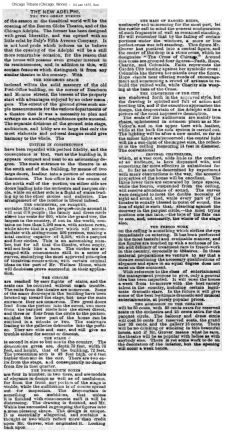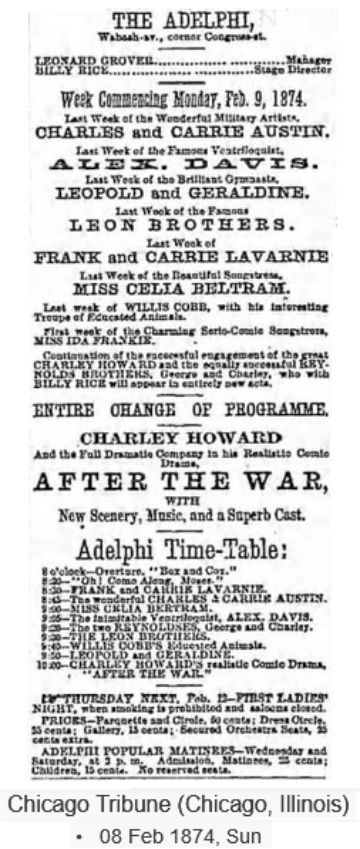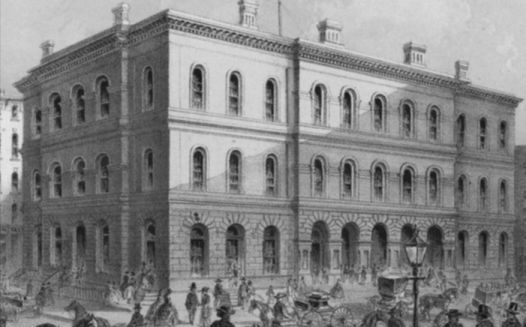|
The Adelphi Theater in Chicago was important in the life of Iroquois
manager Will
J. Davis. It was his first job in the theater
industry. More significantly, the relationship he
formed then with Adelphi co-owner William W. Cole
led to Davis having the financial backing a decade later to acquire
his first theater, the
Haymarket.
Frank Eugene Aiken had built what would
become Chicago's Adelphi theater in 1872 on the
northwest corner of Wabash and Congress streets for
$80,000. Named the Aiken Theater, it was not
successful and closed in 1873. The Aiken Theater
structure was then leased by a corporation headed by
Leonard B. Grover (1833-1926), a well-known
Washington, DC theater owner. Dubbed Great Adelphi,
the structure burned in July 1874.
Six months later, Grover found a new theater
site and a partner. Circus pioneer William W.
"Chilly Billy" Cole came in as a financier with a
50% stake. They took a three-year $7,500 lease on
the old post office property at Dearborn and Monroe,
naming it the Adelphi (below). They converted it to
a 3,400-seat theater that opened in February 1875.
Working for W. W. Cole at the time was future
talent agent William R. Hayden (1842-1897). One of
Hayden's jobs was contracting with railroads for
transporting Cole's circus. In that capacity, Hayden
became acquainted with a young clerk at the Lake
Shore & Michigan Southern Railway: Will J. Davis.
(Davis had secured the Lake Shore job with help from
fellow Elkhartan,
Philo Morehous, who was a director at the LS&MS.)
|

|
Cole was suspicious of his
partner Leonard Grover and wanted someone on the
ground at the Adelphi Theater to keep an eye on his
investment. William Hayden recommended Will J. Davis
to Cole.
Davis' official job at the theater was clerk/treasurer,
but he was soon reporting to Cole on Grover's activities
via letters.
William Washington "Chilly Billy" Cole
(1847-1915 ) was P. T. Barnum's biggest competitor.
Cole became wealthy with his Cole's Colossal Circus
and real estate investments. In his day, Cole was
recalled as the first man to make $1 million in the
circus business and, at his death, left behind a
fortune estimated at $5 million (inflation-adjusted
to $127 million).*
Leonard Grover, Cole's partner in the Adelphi, was a veteran actor,
playwright and theater manager, and had been friendly with
President Abraham Lincoln. He was one of Lincoln's
bodyguards during the Gettysburg address. His
Grover's theater in Washington, DC, was a favorite
of the president and his family. In fact,
Tad Lincoln was at Grover's theater when an
announcement was made to the audience that the president
had been shot.
Someone more experienced in theater
management might have discouraged or tempered Davis'
fault-finding tattling about Grover's management.
Cole, however, was a circus man trying to operate a
theater, and Davis' reports supported Cole's already
damaged opinion of Grover. The Cole-Glover
partnership was dissolved early in 1876 when Cole
sold his interests to Edwin O. Lamphere of Michigan.
Cole was done with theaters but the relationship
between he and Davis was sealed. A decade later, it
led to Davis' advancement to ownership status in the
theater industry.
|
|
Detailed description of Adelphi Theater in Chicago's old post office on Dearborn and Monroe

Enlarge

|

|

Old Post Office on northwest corner of S. Dearborn & Monroe prior to destruction of interior during 1871 Chicago fire. Fronted on Dearborn.
After the Chicago fire destroyed the interior of the post office in 1871,
Chicago debated a suitable use for what remained of the structure, primarily
the exterior walls. Once ownership of the property was transferred from the
government to Chicago's Board of Education, a large expenditure would be
needed to convert it to a library or a courthouse, the most commonly
discussed applications. In any case, it was deemed too small for a
courthouse and too costly for a library. The Board wanted to retain the
option to do something with the building in the future, but the city was
still cash strapped from the fire. When the original Adelphi Theater burned,
the Glover corporation needed a theater, and Chicago needed a tenant for the
old post office.
In 1877 the Adelphi building was acquired by Jack
Haverly. He remodeled it and renamed Haverly's Theater. The First
National Bank acquired the site in 1881 and razed the old
post-office-turned-theater to make way for a bank. Haverly, meanwhile, built
a new Haverly Theater, also on Monroe Street, between Dearborn and Clark.
Renamed the
Columbia in 1885, it burned in 1900 — while owned by Will J. Davis and
Al Hayman.
Discrepancies and addendum
* As of this writing, used
copies of a book about Chilly Billy Cole are
available on Amazon for under $5. Will J. Davis retained
letters from Cole during Davis's time at the Adelphi
and in later years. Davis tried to help Cole recover
a debt from a mutual acquaintance. Cole
once confided
in Davis that he and his wife, Margaret Coble/Koble
Cole (1850-1942), were married before the wedding
ceremony attended by friends and family. The Cole -
Davis letters were last known to be in the hands of
a circus historian.
|
|
|
|
